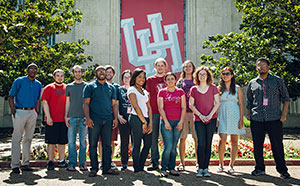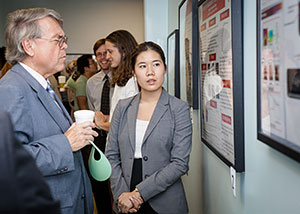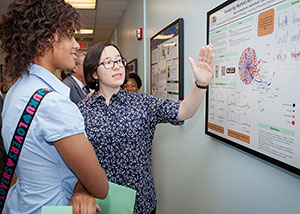Summer Research Experience for Undergraduates Celebrates 10 Years
NSF-Funded Program Draws Students from Across U.S.
Since 2005, undergraduate students from across the U.S. have come to the University of Houston’s Department of Computer Science for the Summer Research Experience for Undergraduates (REU). The program, funded for 10 years by the National Science Foundation, offers students a taste of graduate research.
 Thirteen students, representing 11 universities in seven states and the District of
Columbia, participated in the 2014 program focusing on multimedia data analytics.
Each student worked for 10 weeks with a faculty mentor on a specific research project.
Thirteen students, representing 11 universities in seven states and the District of
Columbia, participated in the 2014 program focusing on multimedia data analytics.
Each student worked for 10 weeks with a faculty mentor on a specific research project.
“Our goal is to encourage more undergraduate students in computer science to pursue graduate studies and research careers,” said Stephen Huang, professor of computer science in UH’s College of Natural Sciences and Mathematics and principal investigator for the NSF grant. “We want to help them realize their full potential.”
The department’s philosophy is that the best way to attract talented students to graduate school and to pursue a career in research is to give students the opportunity to participate directly in the scientific process.
Students selected for the program receive a $5,000 stipend, on-campus housing and meals, and a travel allowance. Since the program’s start, 121 students have participated.
“The program attracts students from all over the nation, so it is a great way to promote the department’s research to other computer science departments,” Huang said.
 Angela Chin, a junior at Harvey Mudd College in Claremont, Calif., worked on a project
to find a way to automatically determine the number of clusters in a given data set.
The findings will be helpful in analysis of medical data.
Angela Chin, a junior at Harvey Mudd College in Claremont, Calif., worked on a project
to find a way to automatically determine the number of clusters in a given data set.
The findings will be helpful in analysis of medical data.
“Instead of having to juggle research with other jobs or courses, the UH program let me entirely focus on my research project,” Chin said. “I have also learned more about specific fields in computer science—data mining and machine learning.”
 Alisa Turchaninova from UH-Downtown spent her summer performing analysis of data collected
from a mobile application that allows users to track their daily calories burned while
walking. The program gave her the opportunity to work with master’s and Ph.D. students
and learn from their example and advice.
Alisa Turchaninova from UH-Downtown spent her summer performing analysis of data collected
from a mobile application that allows users to track their daily calories burned while
walking. The program gave her the opportunity to work with master’s and Ph.D. students
and learn from their example and advice.
“I have a better idea of the components of a research project, from data collection and analysis to effective presentation and communication of the results,” she said.
In addition working on their research projects, students attended weekly seminars, career development lectures and GRE preparation classes. Two field trips exposed participants to collaborative projects at Houston Methodist Hospital and NASA Johnson Space Center. The summer experience closed out with research poster presentations by all participants.
Huang added that the program has attracted six students to UH for their Ph.D. since 2010. Past attendees have also entered Ph.D. programs at other universities, including University of Michigan, Purdue University, Georgia Institute of Technology, University of Oregon, University of Southern California, and Louisiana State University. Several have received NSF Graduate Research Fellowships.
The REU was the department’s first effort in attracting federal grants to support education and outreach in science, technology, engineering and mathematics (STEM) fields. Over the years, the UH computer science department has built on the REU program’s success and received additional STEM awards from NSF.
One such award to Professor Rakesh Verma, Scholarships for Service: Increasing Talented Trusted Computing Professionals, prepares graduate students for government service to help secure, protect and defend our nation's information systems. “This scholarship program enriches cybersecurity education with related fields such as data mining, machine learning, statistics and natural language processing,” said Huang, who is a co-investigator of the new project.
- Kathy Major, College of Natural Sciences and Mathematics